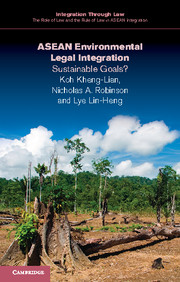Book contents
- Frontmatter
- Contents
- List of tables
- General editors’ preface
- Foreword – Professor Tommy
- Acknowledgments
- Introduction: exploring environmental law in Southeast Asia
- 1 ASEAN and environmental sustainability
- 2 Integrating sustainability into ASEAN state practice
- 3 The environment in the ASEAN region
- 4 Environmental sustainability laws in the ASEAN member states
- 5 ASEAN collaboration towards environmental sustainability
- 6 ASEAN and climate disruption
- 7 Conclusions: ASEAN's challenging way forward
- Executive summary
- Appendix A ASEAN organizational structure relevant to the environment – the ASEAN Charter
- Appendix B Founding of ASEAN – a short history
- Index
Foreword – Professor Tommy
Published online by Cambridge University Press: 05 April 2016
- Frontmatter
- Contents
- List of tables
- General editors’ preface
- Foreword – Professor Tommy
- Acknowledgments
- Introduction: exploring environmental law in Southeast Asia
- 1 ASEAN and environmental sustainability
- 2 Integrating sustainability into ASEAN state practice
- 3 The environment in the ASEAN region
- 4 Environmental sustainability laws in the ASEAN member states
- 5 ASEAN collaboration towards environmental sustainability
- 6 ASEAN and climate disruption
- 7 Conclusions: ASEAN's challenging way forward
- Executive summary
- Appendix A ASEAN organizational structure relevant to the environment – the ASEAN Charter
- Appendix B Founding of ASEAN – a short history
- Index
Summary
It gives me pleasure to write the foreword to this important monograph by three good friends.
Emeritus Professor Koh Kheng-Lian, Emeritus Professor Nicholas A. Robinson and Associate Professor Lye Lin-Heng are three outstanding scholars of environmental law. Both Koh and Robinson have won the Elizabeth Haub Prize for Environmental Law. Koh was former IUCN–WCEL (International Union for Conservation of Nature-World Commission on Environmental Law) Regional Vice-Chair for South and East Asia and a member of its Governing Board, and Robinson was former Chair of IUCN-WCEL and its Governing Board.
Koh initiated a course on ASEAN Environmental Law, Policy and Governance at the Faculty of Law, National University of Singapore (NUS), and has given extensive lectures on the subject in the University of Mexico, the William Richardson School of Law of the University of Hawaii, USA and also a number of law schools in the ASEAN countries.
Robinson and Lye co-teach Comparative Environmental Law at the School of Forestry at Yale University. Lye is the co-founder of the highly successful Master's program on Environmental Management at NUS, and teaches environmental law at NUS, Yale University and the University of Sydney. She is a member of the Board of Governors of the IUCN Academy of Environmental Law.
ASEAN is undergoing a historic transition, from an association to a community by 2015. The adoption of the ASEAN Charter in 2008 was a turning point. ASEAN's ambition is to be a rule-based organization and to take its commitments seriously. It is in this context that the Centre for International Law, NUS and New York University's Law School have jointly launched a major research project on ASEAN integration and the role that law plays in this process.
This monograph is one of a series covering different aspects of ASEAN integration.
I am glad that environment has been included as one book in this series. As the authors have pointed out, over the past thirty-five years, ASEAN has enacted a large corpus of declarations, principles and treaties relating to the environment. My impression is that, in some cases, not all the ASEAN countries have ratified the agreements or implemented other instruments. In other cases, even if all ASEAN countries have ratified an agreement, the implementation has been less than satisfactory. This could be due to a lack of capacity or lack of political will or simply to bad governance.
- Type
- Chapter
- Information
- ASEAN Environmental Legal IntegrationSustainable Goals?, pp. xv - xviPublisher: Cambridge University PressPrint publication year: 2016

